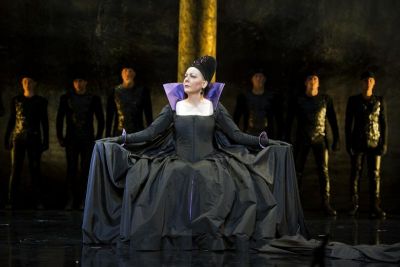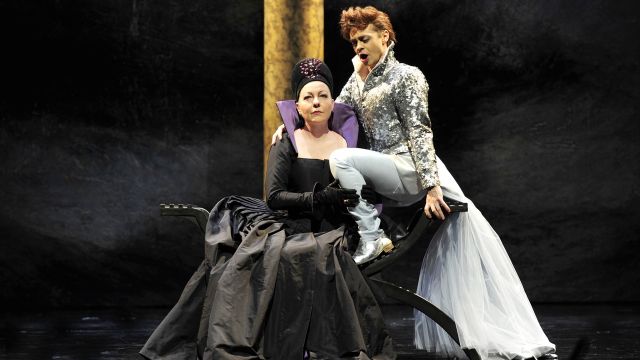Brisbane Baroque 2016
Agrippina (originally created for the Gottingen International Handel Festival) with libretto by Cardinal Vincenzo Grimani, music by George Frideric Handel, directed by Laurence Dale and King Arthur with text by John Dryden, music by Henry Purcell, directed by Rodney Fisher
What a unique experience it is to step back in time and hear a theatrical work sung in its original form both from an orchestral and vocal point of view. Brisbane Baroque has focused on retaining the style by using period instruments and casting counter-tenors as stated in the original score or else to replace the castrati who were so widely used at the time.
I'm including two productions in this review that are both highlights in the festival because though the first seen, Handel's Aggrapina, is more lavish in its presentation and more traditionally operatic in form, the flavour of the second, Henry Purcell's semi-opera King Arthur, still resonates with a distinctive baroque style though being less technically demanding as Handel's florid score.
 What is the major premise of the festival I've seen to date is the high standard of presentation. Almost every performer has been immaculately cast, and often of international renown, while the standard of musical directorship and performance from Erin Helyard, for example, still at the height of his powers as an interpreter of this era, and Brett Weymark some of the best I've ever seen and a highlight of the festival. Others include performances from Ulrike Schneider as Agrippina and Keri Fuge as Poppea, and the numerous counter-tenors, in particular Russell Harcourt with his impressive vocal ambience and character portrayal. And what a treat to see actor Miriam Margolyes bringing to light John Dryden's labouring text. Also worth noting is the effective use of mirrors in Tom Schenk's set design for Agrippina.
What is the major premise of the festival I've seen to date is the high standard of presentation. Almost every performer has been immaculately cast, and often of international renown, while the standard of musical directorship and performance from Erin Helyard, for example, still at the height of his powers as an interpreter of this era, and Brett Weymark some of the best I've ever seen and a highlight of the festival. Others include performances from Ulrike Schneider as Agrippina and Keri Fuge as Poppea, and the numerous counter-tenors, in particular Russell Harcourt with his impressive vocal ambience and character portrayal. And what a treat to see actor Miriam Margolyes bringing to light John Dryden's labouring text. Also worth noting is the effective use of mirrors in Tom Schenk's set design for Agrippina.
In spite of the commendable organisation and presentation of this historic era, there is the question of the entertainment value of some of these historical works. Agrippina was written in 1709 when Handel was just 21 and though it was a success at the time, emerging at height of the opera seria era when the music was often quite complex and technically demanding, it still doesn't work as a theatrical whole. This is partly due to the texts written at the time which lacked the expertise of dramatic form and nuance coming from some of the greats like, for example, Shakespeare. Editing was obviously not high on the agenda in those days. I personally have never been a fan of Handel as a composer for theatre though in King Arthur, Purcell certainly captures the spirit and setting with a score influenced and inspired by English folklore.
Hats off and wigs on for such colourful exposé of Brisbane's continued and flourishing rise in the arts.
Brian Adamson
Images: Agrippina. Photographer - Theodoro da Silva.
Subscribe to our E-Newsletter, buy our latest print edition or find a Performing Arts book at Book Nook.

